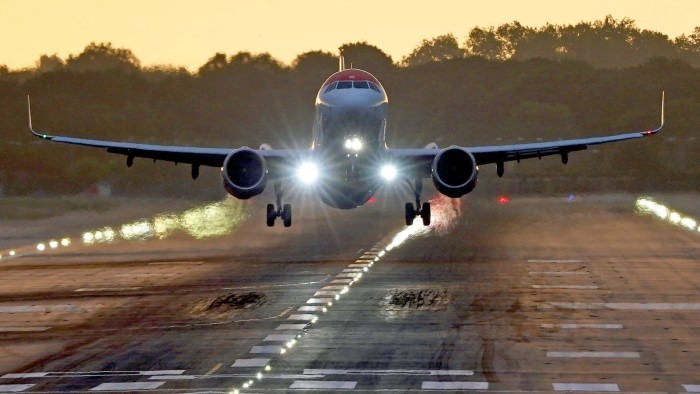Unlock the Editor’s Digest for free
Roula Khalaf, Editor of the FT, selects her favourite stories in this weekly newsletter.
Four out of London’s five major airports are seeking to expand, with ministers set to rule on plans in the coming months.
Transport secretary Heidi Alexander will decide whether to greenlight growth proposals from Luton and Gatwick by the end of April, in a test of the tensions between the Labour government’s twin missions to boost economic growth and cut the UK’s carbon emissions.
London’s City and Stansted airports were recently granted permission to increase passenger numbers.
While the capital’s other major airports are all quietly growing, Heathrow will this year also renew its decades-long attempt to build a third runway.
One government figure said that the Treasury and Downing Street were very keen to expand Britain’s airport capacity, seeing it as “part of the big economic growth story”.
Recent government planning decisions “have all been pro-development”, said Alistair Watson, UK head of planning and environment at law firm Taylor Wessing.
These have included approvals of the demolition of a flagship Marks and Spencer store on London’s Oxford Street, and the construction of a data centre in the Buckinghamshire greenbelt.
Airport expansions have the potential to drive economic growth and connectivity. But aviation is one of the hardest sectors to decarbonise, and environmental groups claim that a huge increase in flight numbers is incompatible with cutting emissions.
Alexander must decide by February 27 on Gatwick’s plan to bring its standby runway into regular use.
The work is part of a £2.2bn project that would enable the airport to handle up to 75mn passengers a year by the late 2030s, up from the record 46.5mn travellers who used the airport in 2019.
“Unless we can access greater airport capacity the UK will miss out on opportunities to enhance global connectivity and unlock further opportunities for trade, tourism and job creation,” said Stewart Wingate, Gatwick’s chief executive.
“This isn’t just about London Gatwick. It’s about making the UK a leader in global connectivity and transport infrastructure,” he said.
The transport secretary will then have until April 3 to rule on Luton airport’s proposals to nearly double passenger numbers to 32mn per year, up from its current permitted capacity of 18mn.
Alberto Martin, chief executive of Luton airport, said its expansion would deliver 11,000 jobs and included “comprehensive commitments” to sustainability.
“Government approval for these plans will unlock a new era of economic growth, job creation and improved connectivity for the region,” he said.

The UK’s most recent policy framework for airport expansion was published in 2018. It backed a new runway at Heathrow and other airports “making best use” of existing infrastructure.
Yet this was written a year before the government committed to a legally binding net zero target, and environmental groups say the UK needs a new strategy to monitor the overall rate of airport expansion, and benchmark the aggregate picture against its climate commitments.
“The current political and planning framework makes it very difficult for anyone to say no to airport expansion,” said Alex Chapman, senior researcher at the New Economics Foundation, a think-tank that opposes expansion.
The Climate Change Committee, the government’s independent climate advisory body, has warned that other sectors would need to make additional emissions savings to offset the impact of airports if annual passenger numbers increased by more than 25 per cent from 2018 levels by 2050.
But airport bosses say there is no reason to block expansion given that the industry has pledged to reach net zero by 2050, mainly by switching to newer and cleaner fuels. They also point to rapid advances in quieter aircraft to help assuage local concerns about noise pollution.
Heathrow has meanwhile indicated that it will finally decide whether to try to build a third runway by the end of 2025.
Its chief executive has said government support for the mega-project will be a big factor.

“Transportation strategy is a government issue, and I think we need to go around the table and say, do we want this?”, Heathrow’s chief executive Thomas Woldbye told an industry conference in November.
Downing Street has expressed support for Heathrow’s expansion provided it meets four tests: delivering growth across the country, meeting climate obligations and complying with air pollution and noise considerations.
However, ministers have been warned by officials that there is “minimal headroom” in the UK’s five-year carbon budgets that govern how much carbon can be emitted, meaning that the climate test will be almost impossible to meet, according to one government figure.
The Labour cabinet also remains split, with energy secretary Ed Miliband having long been a vociferous opponent of the scheme.
The Department for Transport said it could not comment on live planning applications at Gatwick and Luton.
It added: “We are determined to get our economy moving and secure the long-term future of the UK’s aviation sector.
“All expansion proposals must demonstrate they contribute to economic growth . . . while remaining in line with existing environmental obligations.”



